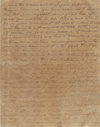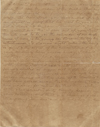Mahatma Letter to H. S. Olcott - LMW 1 No. 16
| Quick Facts | |
|---|---|
| People involved | |
| Written by: | Koot Hoomi |
| Received by: | Henry Steel Olcott |
| Sent via: | unknown |
| Dates | |
| Written on: | unknown |
| Received on: | 20 November 1883 |
| Other dates: | unknown |
| Places | |
| Sent from: | unknown |
| Received at: | Lahore |
| Via: | unknown |
This letter is Letter No. 16 in Letters from the Masters of the Wisdom, First Series. Mahatma Koot Hoomi writes to Henry Steel Olcott about their first physical meetings, and about Olcott's role in the Theosophical Society.[1]
< Prev letter in LMW 1
Next letter in LMW 1 >
< Prev letter to Olcott
Next letter to Olcott >
Page 1 transcription, image, and notes
|
Since the commencement of your probationary term in America, you have had much to do with me, tho’ your imperfect development has often made you mistake me for Atrya, and often to fancy your own mind at work when it was mine trying to influence and to talk with yours. Of course, by your own canons of evidence, you have not until now been a thoroughly qualified witness, since we have never previously — to your knowledge — met in the flesh. But at last you are, and our object in view in my making the journey from the Ashram to Lahore was to give you this last substantial proof. You have not only seen and conversed with, but touched me, my hand has pressed yours, and the K.H. of fancy becomes the K. of fact. Your skeptical action, often running into extreme conservatism —perhaps the very last trait that the careless would suggest of you — has seriously and constantly impeded your inner unfolding. It has made you suspicious — sometimes cruelly so — of Upasika, of Borg, of Djual-K. even of Damodar and D. Nath, whom you love as sons. This meeting of ours should radically change the state of your mind. Should it not, so much the worse for your future; truth never comes, burglar-like, thro’ barred windows and iron-sheathed doors. |
NOTES:
|
Page 2
|
I came to you not alone of my own accord and wish, but also by order of the Maha Chohan, to whose insight the future lies like an open page. At New York you demanded of M. an objective proof that his visit to you was not a maya — and he gave it; unasked, I give you the present one: tho’ I pass out of your sight this note will be to you the reminder of our conferences. I now go to young Mr Brown to try his intuitiveness. Tomorrow night when the camp is quiet and the worst of the emanations from your audience have passed away, I shall visit you again for a longer conversation, as you must be forewarned against certain things in the future. Fear not and doubt not as you have feared and doubted at supper last night: the first month of the coming year of your era will have hardly dawned when two more of the ‘enemies’ will have passed away. Ever be vigilant, zealous and judicious; for remember that the usefulness of the Theosophical Society largely depends upon your exertions, and that our blessings follow its suffering ‘Founders’ and all who help on their work.
|
NOTES:
|
Note attached to letter
|
Notation attached to letter in Olcott's handwriting: Letter to H.S.O formed in his own hand by Master K.H. during a night visit to him, in his camp on the Maidan outside Lahore. (See. O.D.L.) |
NOTES:
|
Context and background
Mr. Jinarajadasa provided these notes about this letter:
Transcribed from the original at Adyar. To it is attached a card in the handwriting of Colonel Olcott as follows: ‘Letter to H.S.O. formed in his own hand by Master K.H. during a night visit to him, in his camp at the Maidan, outside Lahore' (See O.D.L., Third Series, pp.39-40).
The long paragraph in the letter beginning, ‘Since the commencement’, and ending, ‘iron-sheathed doors’, does not appear in the first edition. This is due to a blunder on my part. The letter is written in ink on a sheet of typewriter size of paper, and written on both sides. It was folded. I opened and read the side with the signature, beginning, ‘I come to you’, and ending ‘all who help on their work. K.H.’ It never occurred to me to turn the sheet over. It was some years after the first edition appeared, when going through the letters searching for some text, that on reading this letter once again I happened quite casually to turn the sheet over. I saw then to my surprise that what I had taken to be page 1 was in reality page 2. I published the text at once in The Theosophist.
D. Nath is Dharbgiri Nath, one of the pupils who, for a while, took possession of the body of ‘Bawaji’ or, to give his proper name, S. Krishnamachari. Bawaji went with H.P.B. to Europe in 1885, but finally turned against her. He is ‘the little man’ who ‘has failed’ of Letter 37. The letter which H.P.B. wrote to C.W. Leadbeater on this ex-chela’s defection is reproduced in my book, The K.H. Letters to C.W. Leadbeater.[2]
Colonel Olcott mentions (O.D.L., Third Series p. 37) that ‘two more of the “enemies” will have passed away’ was a prophecy of the deaths of Swami Dayanand Saraswati, the founder of the Arya Samaj, and Keshub Chandra Sen, the head of one section of the Brahmo Samaj.[3]
Colonel Olcott in Old Diary Leaves, Third Series, pp. 36-7, describes the incident of receiving this letter.
‘Objective proof’ refers to the visit of the Master M. to Colonel Olcott in New York, described in Old Diary Leaves, First Series, pp. 379-80. The ‘objective proof’ is the fehta or turban, now at Adyar, which the Master M. left with the Colonel as a proof that his visit was not a ‘Maya’ but was a reality.[4]
Physical description of letter
According to Mr. Jinarajadasa, the original letter is at the Adyar headquarters of the Theosophical Society.
Publication history
A portion of this letter was published in 1919 as Letter 16 in the first edition of Letters from the Masters of the Wisdom, 1881-1888, later known as the First Series.[5] It has kept this designation as Letter 16 throughout all editions.
Commentary about this letter
Additional resources
Notes
- ↑ C. Jinarajadasa, Letters from the Masters of the Wisdom, First Series (Adyar, Chennai, India: Theosophical Publishing House, 2011), 44-45, 147-148.
- ↑ See Curuppumullage Jinarājadāsa, The "K. H." Letters to C. W. Leadbeater (Adyar, Madras: The Theosophical Publishing House, 1980), 52.
- ↑ Note: Dayanand Saraswati died on 30 October 1883,and Keshub Chandra Sen died on 8 January 1884.
- ↑ C. Jinarajadasa, 147-148.
- ↑ Letters from the Masters of the Wisdom, 1881-1888. Adyar, Madras, India; London: Theosophical Publishing House, 1919. Foreword by Annie Besant; transcribed and compiled by C. Jinarajadasa.


